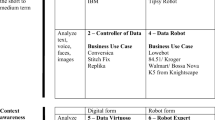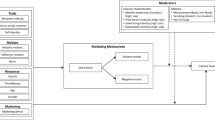Abstract
In a duopoly market, aspiration levels express how much sellers want to earn given their expectations about the other’s behavior. We augment the sellers’ decision task by eliciting their profit aspiration. In a first experimental phase, whenever satisficing is not possible, sales choices, point beliefs, or aspiration levels have to be adapted. This allows us to compare “aspiration-based satisficing” to “aspiration adaptation”. In a second phase, testing the absorption of satisficing, participants are free to select non-satisficing sales profiles. The results reveal that most participants are satisficers who, in line with aspiration adaptation theory, tend to adjust aspiration levels and to keep sales behavior nearly unchanged.
Similar content being viewed by others
References
Arthur WB (1994) Inductive reasoning and bounded rationality, American Economic Review 84, Papers and Proceedings of the Hundred and Sixth Annual Meeting of the American Economic Association, pp 406–411
Babcock L, Farber HS, Fobian C, Shafir E (1995) Forming beliefs about adjudicated outcomes: perceptions of risk and reservation values. Int Rev Law Econ 15: 289–303
Camerer C, Hogarth RM (1999) The effects of financial incentives in experiments: a review and capital-labor-production framework. J Risk Uncertain 19: 7–42
Camerer C, Ho T, Chong J-K (2004) A cognitive hierarchy model of games. Q J Econ 119: 861–898
Costa-Gomes MA, Crawford V (2006) Cognition and behavior in guessing games: an experimental study. Am Econ Rev 96: 1737–1768
Dixon HD (2000) Keeping up with the Joneses: competition and the evolution of collusion. J Econ Behav Organ 43: 223–238
Ebenhöh E (2006) Modeling non-linear common-pool resource experiments with boundedly rational agents. In: Sichman JS, Antunes L (eds) Lecture notes in computer science. Springer-Verlag, Berlin/Heidelberg
Fischbacher U (2007) Zurich toolbox for readymade economic experiments. Exp Econ 10: 171–178
Greiner B (2004) An online recruitment system for economic experiments. In: Kremer K, Macho V (eds) Forschung und wissenschaftliches Rechnen 2003. GWDG Bericht 63, Gesellschaft für Wissenschaftliche Datenverarbeitung, Göttingen
Güth W (2007) Satisficing in portfolio selection: theoretical aspects and experimental tests. J Socio Econ 36: 505–522
Güth W, Kliemt H (2004) Bounded rationality and theory absorption. Homo Oecon 21: 521–540
Güth W, Levati MV, Ploner M (2008) Satisficing and prior-free optimality in price competition: a theoretical and experimental analysis, Jena Economic Research Papers in Economics No. 2008-067
Güth W, Levati MV, Ploner M (2009) An experimental analysis of satisficing in saving decisions. J Math Psychol 53: 265–272
Heifetz A, Minelli E (2006) Aspiration traps, Working Papers ubs0610, Department of Economics, University of Brescia, Italy
Holt C (1985) An experimental test of the consistent-conjectures hypothesis. Am Econ Rev 75: 315–325
Huck S, Müller W, Normann H-T (2001) Stackelberg beats Cournot: on collusion and efficiency in experimental markets. Econ J 111: 749–765
Huck S, Konrad KA, Müller W, Normann H-T (2007) The merger paradox and why aspiration levels let it fail in the laboratory. Econ J 117(522): 1073–1095
Karandikar R, Mookherjee D, Ray D, Vega-Redondo F (1998) Evolving aspirations and cooperation. J Econ Theory 80: 292–331
Lilly G (1994) Bounded rationality: a Simon-like explication. J Econ Dyn Control 18: 205–230
Markovitch S, Rosdeutscher I (1992) Systematic experimentation with deductive learning: satisficing vs. optimizing search, Proceedings of the Knowledge Compilation and Speedup Learning Workshop, Aberdeen, Scotland
Napel S (2003) Aspiration adaptation in the ultimatum minigame. Games Econ Behav 43: 86–106
Oechssler J (2002) Cooperation as a result of learning with aspiration levels. J Econ Behav Organ 49: 405–409
Sauermann H, Selten R (1962) Anspruchsanpassungstheorie der Unternehmung. Zeitschrift für die gesamte Staatswissenschaft 118: 577–597
Selten R (1998a) Aspiration adaption theory. J Math Psychol 42: 191–214
Selten R (1998b) Features of experimentally observed bounded rationality. Eur Econ Rev 42: 413–436
Selten R (2001) What is bounded rationality?. In: Gigerenzer G, Selten R (eds) Bounded rationality: the adaptive toolbox. MIT Press, Cambridge
Simon HA (1955) A behavioral model of rational choice. Q J Econ 69: 99–118
Simon HA (1979) Rational decision-making in business organizations. Am Econ Rev 69: 493–513
Smith VL (2008) Rationality in economics: constructivist and ecological forms. Cambridge University Press, New York
van Witteloostuijn A (1988) Maximising and satisficing: opposite or equivalent concepts?. J Econ Psychol 9: 289–313
Zwick R, Rapoport A, Lo A, Muthukrishnan A (2003) Consumer search: not enough or too much?. Market Sci 22: 503–519
Author information
Authors and Affiliations
Corresponding author
Rights and permissions
About this article
Cite this article
Berninghaus, S., Güth, W., Levati, M.V. et al. Satisficing search versus aspiration adaptation in sales competition: experimental evidence. Int J Game Theory 40, 179–198 (2011). https://doi.org/10.1007/s00182-010-0232-z
Accepted:
Published:
Issue Date:
DOI: https://doi.org/10.1007/s00182-010-0232-z




